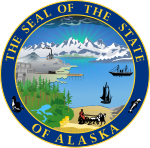Recount
As the results were counted state officials said that the contest between Knowles and Campbell was too close to call, with Knowles having a small lead. [5] Knowles declared victory on the November 18 after the official count showed that he was ahead of 528 votes with only 217 votes remaining to be counted. [6] He described the victory as the "largest margin I think I've ever won by" as his Anchorage mayoralty election wins had always been by very narrow margins. [6]
Campbell contested the results and called for a recount, which was paid for by the state as the candidates were within half a percent of each other. [7] Campbell also wanted to look into some voter incentives that had taken place including raffles and free gasoline for voters. These were defended as attempts to increase turnout and had been authorised by election officials. [8]
The initial count showed Knowles with 87,701 votes and Campbell with 87,118 votes. The results of the recount slightly narrowed the gap between them with Knowles ending on 87,693 and Campbell on 87,157. [9] Knowles's victory margin was the smallest in any Alaska gubernatorial election. [8] [10]
This page is based on this
Wikipedia article Text is available under the
CC BY-SA 4.0 license; additional terms may apply.
Images, videos and audio are available under their respective licenses.




